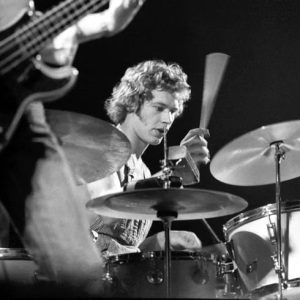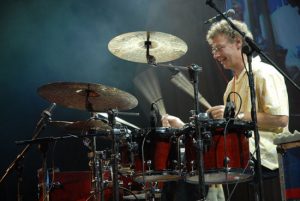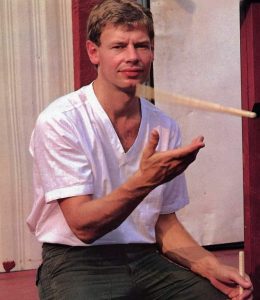HIT CHANNEL EXCLUSIVE INTERVIEW: August 2010. We talked to Bill Bruford, the legendary drummer of Yes, King Crimson, Genesis and Earthworks. There is no doubt that Bill Bruford is one of the greatest drummers in music history. This isn’t only my personal belief, but musicians like Danny Carey (Tool-drums), Chad Cromwell (Neil Young, Willie Nelson-drums) and Neil Murray (Whitesnake, Black Sabbath, Peter Green-bass) share the same thought. Bill spoke to us about his career, his successful autobiography and his views about today’s music. Read below a very sincere conversation:
 Your autobiography was released last year, a few months after your retirement. It was something you always wanted to do or it’s just the ending titles of your career? Is there any material you didn’t include in book for any reason?
Your autobiography was released last year, a few months after your retirement. It was something you always wanted to do or it’s just the ending titles of your career? Is there any material you didn’t include in book for any reason?
The book is part anecdote, part confessional, part music lesson, public service. I wrote it to put a line under the performance part of my life – to explain it to myself, to explain it to other people, and because I wouldn’t believe it unless I wrote it down.
It’s about a musical life – mine – but more interestingly it’s about the musical life in the broader sense, as I’ve lived it for four decades. It’s a series of observations about the musical life for a non-classical instrumentalist, based on and abstracted from my personal experience. Where we’ve been, and where we’re going with this…
It’s about the pleasures, perils, and pitfalls of playing percussion in public, certainly, but it’s also about what musicians do when they’re not trying to be rock stars, what they do in the ‘daytime’. I’ve written it for the starry-eyed beginner, the seasoned pro and the inquisitive layman. The demand exists because it is evident from the many people I talk to that they haven’t much idea about what we instrumentalists do, or why we do it, and I thought I’d try to explain.
Thousand fans (include me), were shocked when we learned that you’re quitting from drumming. We believe that you can still play at high level. What was the main reason of your retirement? Did the support from fans can regain your self-confidence and your doubts? (as it’s written in the Guardian,2009)
I retired because firstly, 41 years of me is enough for anyone, certainly enough for me! Anyway, the garden needs mowing. And I don’t want to die in a hotel room. Secondly, the musical path is a very self-obsessed sort of existence that causes heavy wear and tear on one’s nearest and dearest who’s patience may already be exhausted. I need to redress a balance…Thirdly , it was time to move over and let others have a go. I’m more interested to hear what the kids can do. I’d rather stop before I’ve become irrelevant rather than after. Fourthly, all the relentless self-promotion is just so ‘unseemly’ as the great Meryl Streep said recently. And finally, if I don’t put it down now, it’ll kill me sooner rather than later. If you play every gig as your last, as you should do, after a while that’s going to wipe you out. I think a whole bunch of people should retire: Mick Jagger, Tina Turner, the Moody Blues, the Osmonds, anyone who’s marking time clogging up a stage.
You personal “vehicle” for many years was Earthworks and you made some great albums with them. Do you think that Earthworks, should receive more recognition from listeners?
Earthworks was very well received by listeners, and we toured all over the world. Sadly, we never got to Greece, for some reason. Obviously improvised instrumental jazz is not going to be as popular as repetitive rock music – that’s not a problem.
 You’re a pioneer of progressive rock drumming (and music). Did you realise then (in early 70’s) that you created history or you treated the music you made as something normal ?
You’re a pioneer of progressive rock drumming (and music). Did you realise then (in early 70’s) that you created history or you treated the music you made as something normal ?
It was something normal, although remember that the rock music industry in the 1970s was going through an abnormally creative period. Everyone wanted to experiment and come up with new ideas – musicians and groups alike. We thought that was normal, altho’ generally it is the opposite nowadays. In Yes and King Crimson and Genesis we just wanted to come up with new ideas that made you sound different to other bands. Yes started as a covers band. Slowly we extended the compositions with interesting extra sections of music and then we started to write our own material. But we started off by doing covers. We tried – and were given time – to move our style forward, by trying to make each album a refinement of its predecessor. Progressive musicians were being paid well to progress.
You’re a jazz lover. Which are your jazz influences? Do you think Ginger Baker made many drummers to open horizons to then-unknown kinds of music (as African etc.)?
I grew up with jazz, and listened to everyone and everything. But my favourite drummers were Max Roach, Joe Morello, Art Blakey, and as a kid, Ginger Baker. Max had elegance, economy of movement, and a sense of architecture in his playing that intrigued me as a kid. I wanted that effortless kind of grace at the set. He never spoilt his suit with sweat! I covered solos of his ( ‘The Drum Also Waltzes’ on my album Masterstrokes, and ‘Self-Portrait’ with the World Drummers Ensemble ) as a tribute to him, and to reference my style to his. I met him several times at King Crimson shows. Always interested in new things, he was there checking out my electronic percussion. His recent death (2007) leaves the drum community a poorer place.
Joe Morello fascinated me in the Brubeck Quartet of the mid-60s with tunes like ‘Far More Drums’, ‘It’s a Raggy Waltz’, and ‘Take Five’. He had spectacular technical ability, very smooth, but also a great ability with odd time signatures. Mostly we only played in duple or triple meters in those days, and Joe opened a whole world of odd numbers and Turkish rhythms that I took to like a duck to water. I could never think of anything of interest to play in 4/4, but had something to offer if we could make it in 5/4. As with Max, I covered one of his famous 5/4 solos on my album ‘If Summer Had Its Ghosts’
Watching B.B.C. television as a kid in the late 60s, I heard all the great American jazz musicians coming through London. They were filmed and recorded for a prime-time TV show called Jazz 625. I heard everybody, but particularly Art Blakey’s Jazz Messengers. Art had this thundering deep tom sound, and a snare drum roll from Heaven. I loved the way he controlled the band, like a guy driving a fast race-car, or a thoroughbred horse. Nobody went anywhere without Art’s say-so, but when it was time to play, he fired them up, stoked the fires, and then reigned them in. Complete control. From Art I took that idea, and also the colour and timbre of his sound.
I loved Ginger’s work when I waatched him in the London Clubs when I was 16. But his influence, altho’ huge, was well before any notions of world music, and there was precious little talk of the drumming of other cultures until the 1980s.
Your career always suffered from compromises. If you ‘d start today, will you play again in bands? Do you think that with compromises, several good music ideas didn’t come to surface?
I think you may misunderstand the word ‘compromise’ – I never compromised anything! I always played the muisc I wanted with the people I wanted where I wanted and when I wanted. And I was very privileged to be able to do so. Maybe I was among the last generation of drummers that was able to be that creative all the time. Eventually I had to move to jazz because rock was going to hell, but it was possible to be also very creative in jazz.
 You played with many great musicians. Is there any you’d like to play with and didn’t happen? Maybe Jeff Beck?
You played with many great musicians. Is there any you’d like to play with and didn’t happen? Maybe Jeff Beck?
I could conceivably, in another world, have wanted to play with Joe Zawinul, but I don’t think I was good enough, or had enough to offer him, so I didn’t call him.
Tell an advice to a child who just started playing drums?
Practice, practice, and practice! And listen carefully to what you play, because every note is important.
Send a message to Greek fans.
Sorry I never made it to Greece to play for you, but please visit www.billbruford.com and listen to the stuff you would have heard there! I know the Greek fans have been huge supporters of the Yes and King Crimson, so I am very grateful for that support.
A huge “THANK YOU” to Mr Bill Bruford and his webmaster.
Please check out www.billbruford.com

